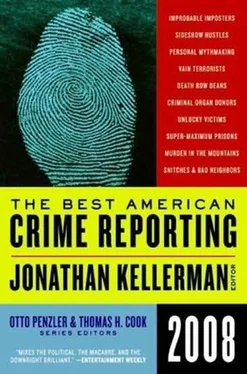ROSS ACCUSED CARTER FOSTER, AMONG OTHERS, OF HAVING burned Irvine’s S.U.V. Foster pointed out that he hadn’t even been on the island at the time of the fire. That assertion had no effect on Ross, who told Foster and Sarah Wormell that they had better sleep with their eyes open, because “a flaming ball of fire is going to come through your window.” That evening, Ross piled some wooden palettes in his front yard, right next to the street, put a couple of propane tanks on top of the pile, started a fire, and, according to Foster, said that he was going to blow up the entire neighborhood. The R.C.M.P. constables who put the fire out were told by Ross that people at a community meeting had decided to burn his house down. During the next few weeks, various accusations were exchanged, including a claim by Ross that, even before the car fire, someone had thrown a propane tank through his living-room window. R.C.M.P. Constable Gerald Bigger had what sounds like a rather typical confrontation, in which Ross went from obscene gestures and obscene language to picking up a large rock and saying, according to the constable’s report:
“I ought to drive this through you.” I pulled my side arm from my holster, placed it by my side and told him if he raised the rock in my direction he’d be shot. Ronald threw the rock down. He continued to yell, call names and swear. Then, as quick as it started it was over. Ronald jumped across the ditch, said he didn’t like to be called a loser or laughed at. I told him that I didn’t like to be called names. He said he only called me the names because he thought that I didn’t like him. Ronald also accused me of conspiring with the community to burn him out. I told him that I wasn’t part of any conspiracy and that I wasn’t aware of any community meeting to burn him out. Before leaving, Ronald shook my hand and invited [me] to drop by his place anytime for a drink.
A lot of rumors went around the island, many of them about who might arrive from the mainland and what they intended to do to avenge the burning of Irvine’s S.U.V. On Grand Manan, some rumor enhancement is taken for granted. It has always been said that if hailstones the size of mothballs start to fall in North Head they’re the size of icebergs by the time the story reaches Seal Cove. Some of the rumors, though, were disturbingly specific. Larry Marshall, a wrinkler and dulse-gatherer, heard that Ross was importing people from the mainland to burn eight or ten houses, with Carter Foster’s house at the top of the hit list. Marshall’s brother, Harold, whom he customarily describes as “a bag of trouble with a capital ‘T,’” hung around with Ross. The two of them, Larry Marshall told Foster, were “planning to have people come from away with dynamite and machine guns.” A volunteer fireman later told the R.C.M.P., “I heard…that Ronnie Ross had some of his friends come down, supposedly from the Hell’s Angels.” It was said that on July 21st, a Friday, ten thugs were going to be arriving from St. John in an S.U.V., presumably the vehicle that would take them around to the houses on their hit list. The estimate quickly grew to twenty.
Not long after midnight on that Friday night, Constable Bigger stopped by Carter Foster’s house. By that time, there were thirty or forty men in Foster’s yard. A number of them were, in Foster’s words, people “who’d had something stolen and knew where it went.” Some were people who had come from a baseball game and were still in their uniforms. Some were older men who were saying that Carter Foster and his neighbors oughtn’t to put up with Ronnie Ross. Constable Bigger informed Foster that the rumor about twenty hoodlums arriving from the mainland wasn’t true. Irvine’s new vehicle, a white G.M.C. Yukon, had been stopped by the R.C.M.P. when it left the ferry and had turned out to contain only three men and no weapons. Foster told Bigger that he had, in fact, spotted the three men at Ross’s. According to the constable’s report, Foster said that if the crowd at 61 Cedar started something, he and his friends were going to finish it. Sara Wormell, a polite young woman who likes to take photographs and keep journals, had put her dog and some family papers and favorite photographs in her car. “I thought for sure our house was going to be burnt down,” she later said.
The talk on both sides of houses being burned down would have come as no surprise to one summer resident-Marc Shell, the Irving Babbitt Professor of Comparative Literature at Harvard, who recently completed research for a book called “Grand Manan; or, a Short History of North America.” Shell concluded that on Grand Manan, which has always been lightly policed by officers sent from the mainland, “unpopular groups are often driven off island by fire” and “sometimes the only form of law enforcement is illegal police-enforced banishment.” As far back as 1839, for instance, the Episcopal church was destroyed by fire, and any question about whether the blaze had been started by what a church statement called “a sacrilegious incendiary” was settled by a note at the scene containing, according to the same statement, “language which betokens premeditated malevolence and hostility against the Bishop of the Diocese, against the Rector of this Parish in particular, and four other persons of this County.” All of the men brought to trial for the arson were acquitted.
“THE IDEA WAS to put the fear of God in ’em, get ’em on the boat, and get ’em the hell off the island,” a lifelong Grand Mananer said recently. “But it got out of hand.” On Friday the twenty-first, Erin Gaskill was told that she might want to have her children sleep over at their grandmother’s that evening. According to later court testimony, there had been hints, or perhaps more than hints, from the R.C.M.P. that calls involving Ronnie Ross would not draw a swift response. For a while, the people in Foster’s yard seemed less like a group of aroused citizens than like a bunch of men attending a barbecue. Accounts of what happened when the trouble started are imprecise. It was dark. People on both sides of Cedar Street had been drinking. It’s clear that the sides were not evenly matched-there were fewer than a dozen people at Ross’s-and were not cleanly divided between outsiders and islanders. Some of the people at Ross’s house were from Grand Manan and a few of the people on Carter Foster’s side of the street may at times have tempered their outrage at drug dealers with a few purchases of their own. It’s clear that at one point some of the men on Foster’s side were carrying bats, and at least one of Ross’s crew had a knife taped to a pole. Shortly after midnight, Carter Foster and several companions moved into Cedar Street to confront the men who had come out of Ross’s house. “You’re going to fucking get off the island!” Foster shouted at Ross. He and Ross began to fight. Foster, who was winning, had Ross in a choke hold when the shooting started.
The shots seemed to be coming from Ross’s house. Foster let go of Ross, went back to his own house, and got his rifle-a high-powered sniper model that he is licensed to use on seals that get into the herring weirs. He climbed onto the roof and started shooting at the white Yukon parked in Ross’s driveway. He fired at least once at Ross’s porch light. “People in my group were saying, ‘Shoot the shooter,’” Foster later told the R.C.M.P. “I can’t do that. I couldn’t even put a person in my sights… So I proceeded to shoot the vehicle to disable it for our own protection, so they wouldn’t take off and get out of there. And, at the same time this was all going off, some people on our side had rocket flares, pistol flares, different things like that.” The exchange of gunfire went on for five or ten minutes. Remarkably, no one was hit by a bullet, although Ross was struck in the leg by a flare. By the time the three available R.C.M.P. officers arrived, the shooting had stopped and no one was in the street. Later, though, fights broke out that the Mounties seemed powerless to stop. Both Ross and Irvine were beaten up. At some point, a couple of young men from Foster’s side of the street circled around behind Ross’s house, poured out some fuel, and tossed in a match. Flames shot out the back wall, and the people inside the house rushed out the front door.
Читать дальше












